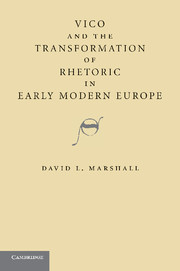6 - The New Science of Rhetoric
Published online by Cambridge University Press: 06 July 2010
Summary
The Scienza nuova—first published at Naples in 1725 and rewritten considerably in 1730 and 1744—is the reason that Vico has become a major figure in the history of European thought. It is also the work in which Vico's sublimation of rhetoric is most inconspicuous and yet most fully articulated. The Scienza nuova is an attempt to found a new mode of inquiry that examines the origins of human community. It is an investigation into the conditions of possibility for living in society with others. At base, rhetoric too had been an application of the human mind to the issues raised by living in community with others. Speech is the most discerning medium for the registration of human diversity, because speech is the chief means by which human beings distinguish themselves from others. Persuasion is a process that follows from the collision of inevitable diversity of opinion and the inescapable necessity of making collective decisions that license actions.
On the surface, though, the Scienza nuova bears almost no resemblance to the ars rhetorica as one encounters it in Aristotle, Cicero, and Quintilian. I have been arguing that Vico revised rhetoric primarily because he was both deeply committed to its insights and deeply aware of the political incapacity of his own community. Caught in this contradiction, Vichian rhetoric emerged as a new science dedicated to the investigation of living with others in the absence of institutions that guarantee the possibility of open debate.
- Type
- Chapter
- Information
- Vico and the Transformation of Rhetoric in Early Modern Europe , pp. 193 - 262Publisher: Cambridge University PressPrint publication year: 2010



